
CBU 模组规格书
更新时间:2022-06-02 03:45:27下载pdf
CBU 是由杭州涂鸦信息技术有限公司开发的一款低功耗嵌入式 Wi-Fi 模组。它由一个高集成度的无线射频芯片 BK7231N 和少量外围器件构成,可以支持 AP 和 STA 双角色连接,并同时支持低功耗蓝牙连接。
产品概述
CBU 内置运行速度最高可到 120 MHz 的 32-bit MCU,内置2Mbyte 闪存和 256 KB RAM。可以使得模组支持Tuya云连接,并且 MCU 专为信号处理扩展的指令使其可以有效地实现音频编码和解码。拥有丰富的外设,如 PWM、UART、SPI。多达五路的 32 位 PWM 输出使芯片非常适合高品质的 LED 控制。
特性
- 内置低功耗 32 位 CPU,可以兼作应用处理器
- 主频支持 120MHz
- 工作电压:3.0V~3.6V
- 外设:5×PWM,2×UART,1×SPI
- Wi-Fi 连通性
- 802.11 b/g/n
- 通道1-14@2.4GHz
- 支持WEP,WPA/WPA2,WPA/WPA2 PSK (AES), WPA3 安全模式
- 802.11b模式下最大+16dBm的输出功率
- 支持STA/AP/STA+AP工作模式
- 支持SmartConfig和AP两种配网方式(包括Android和IOS设备)
- 板载PCB天线,天线峰值增益2.2dBi
- 工作温度:-40℃ to 105℃
- 蓝牙连通性
- 蓝牙模式支持6 dBm 发射功率
- 完整的蓝牙共存接口
- 板载PCB天线,天线峰值增益2.2dBi
应用领域
- 智能楼宇
- 智慧家居/家电
- 智能插座、智慧灯
- 工业无线控制
- 婴儿监控器
- 网络摄像头
- 智能公交
更新说明
| 更新日期 | 更新内容 | 更新后版本 |
|---|---|---|
| 2020-10-16 | 新建文档 | V1.0.0 |
| 2020-11-24 | 更新测试数据 | V1.0.1 |
模组接口
尺寸封装
CBU尺寸大小:15.8±0.35mm (W)×20.3±0.35mm (L) ×2.7±0.15mm (H)。CBU尺寸如下图所示:
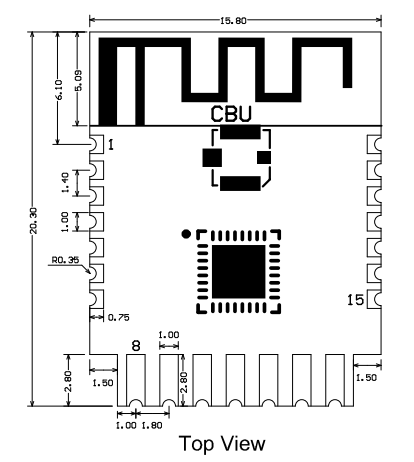
引脚定义
| 引脚序号 | 符号 | IO类型 | 功能 |
|---|---|---|---|
| 1 | P14 | I/O | 普通GPIO,可以复用为SPI_SCK(对应IC的Pin 11) |
| 2 | P16 | I/O | 普通GPIO,可以复用为SPI_MOSI(对应IC的Pin 12) |
| 3 | P20 | I/O | 普通GPIO(对应IC的Pin 20) |
| 4 | P22 | I/O | 普通GPIO(对应IC的Pin 18) |
| 5 | ADC | I/O | ADC口,对应IC的P23(对应IC的Pin 17) |
| 6 | RX2 | I/O | UART_RX2,对应IC的P1(对应IC的Pin 28) |
| 7 | TX2 | I/O | UART_TX2,打印日志口,对应IC的P0(对应IC的Pin 29) |
| 8 | P8 | I/O | 支持硬件PWM2(对应IC的Pin 24) |
| 9 | P7 | I/O | 支持硬件PWM1(对应IC的Pin 23) |
| 10 | P6 | I/O | 支持硬件PWM0(对应IC的Pin 22) |
| 11 | P26 | I/O | 支持硬件PWM5(对应IC的Pin 15) |
| 12 | P24 | I/O | 支持硬件PWM4(对应IC的Pin 16) |
| 13 | GND | P | 电源地 |
| 14 | 3V3 | P | 电源3V3 |
| 15 | TX1 | I/O | UART_TX1,用户数据发送口,对应IC的Pin 27;MCU通用对接参考<CBx 系列模组 MCU对接设计指南> |
| 16 | RX1 | I/O | UART_RX1,用户数据接收口,对应IC的Pin 26;MCU通用对接参考<CBx 系列模组 MCU对接设计指南> |
| 17 | P28 | I/O | 普通GPIO(对应IC的Pin 10) |
| 18 | CEN | I/O | 复位脚,低电平有效,内部拉高处理,兼容其他模组设计对接(对应IC的Pin 21) |
| 19 | P9 | I/O | 普通GPIO(对应IC的Pin 25) |
| 20 | P17 | I/O | 普通GPIO,可以复用为SPI_MISO(对应IC的Pin 14) |
| 21 | P15 | I/O | 普通GPIO,可以复用为SPI_CS,非SPI应用不建议使用该引脚(对应IC的Pin 13) |
| 测点 | CSN | I/O | 模式选择脚,上电前拉低进入测试固件,悬空或拉高进入应用固件。对应IC的Pin 19 |
说明:P 表示电源引脚,I/O 表示输入输出引脚。
MCU对接方案需参照涂鸦设计文档 CBx 系列模组 MCU对接设计指南。
电气参数
绝对电气参数
| 参数 | 描述 | 最小值 | 最大值 | 单位 |
|---|---|---|---|---|
| Ts | 存储温度 | -55 | 125 | ℃ |
| VBAT | 供电电压 | -0.3 | 3.9 | V |
| 静电释放电压(人体模型) | TAMB-25℃ | -4 | 4 | kV |
| 静电释放电压(机器模型) | TAMB-25℃ | -200 | 200 | V |
正常工作条件
| 参数 | 描述 | 最小值 | 典型值 | 最大值 | 单位 |
|---|---|---|---|---|---|
| Ta | 工作温度 | -40 | - | 105 | ℃ |
| VBAT | 供电电压 | 3 | 3.3 | 3.6 | V |
| VOL | IO低电平输出 | VSS | - | VSS+0.3 | V |
| VOH | IO高电平输出 | VBAT-0.3 | - | VBAT | V |
| Imax | IO驱动电流 | - | 6 | 20 | mA |
射频功耗
| 工作状态 | 模式 | 速率 | 发射功率/接收 | 平均值 | 峰值(典型值) | 单位 |
|---|---|---|---|---|---|---|
| 发射 | 11b | 11Mbps | +16dBm | 270 | 300 | mA |
| 发射 | 11g | 54Mbps | +15dBm | 260 | 280 | mA |
| 发射 | 11n | MCS7 | +14dBm | 253 | 273 | mA |
| 接收 | 11b | 11Mbps | 连续接收 | 73 | 82 | mA |
| 接收 | 11g | 54Mbps | 连续接收 | 75 | 82 | mA |
| 接收 | 11n | MCS7 | 连续接收 | 75 | 82 | mA |
工作电流
| 工作模式 | 工作状态,Ta=25℃ | 平均值 | 最大值(典型值) | 单位 |
|---|---|---|---|---|
| 快连配网状态(蓝牙配网) | 模组处于快连配网状态,Wi-Fi指示灯快闪 | 85 | 360 | mA |
| 快连配网状态(AP配网) | 模组处在热点配网状态,Wi-Fi指示灯慢闪 | 80 | 380 | mA |
| 快连配网状态(EZ配网) | 模组处于快连配网状态,WIFI指示灯快闪 | 87 | 360 | mA |
| 网络连接状态 | 模组处于联网工作状态, Wi-Fi 指示灯常亮 | 85 | 390 | mA |
| 弱网连接状态 | 模组和热点处于弱网连接状态, Wi-Fi 指示灯常亮 | 208 | 395 | mA |
| 网络断连状态 | 模组处于断网工作状态, Wi-Fi 指示灯常灭 | 78 | 385 | mA |
| 模组Disable状态 | 模组处于CEN拉低状态 | 330 | - | uA |
射频参数
基本射频特性
| 参数项 | 详细说明 |
|---|---|
| 工作频率 | 2.412~2.484GHz |
| Wi-Fi标准 | IEEE 802.11b/g/n(通道1-14) |
| 数据传输速率 | 11b:1,2,5.5, 11 (Mbps); 11g:6,9,12,18,24,36,48,54(Mbps); 11n: HT20 MCS0~7; 11n: HT40 MCS0~7 |
| 天线类型 | PCB天线 |
Wi-Fi发射性能
| 参数项 | 最小值 | 典型值 | 最大值 | 单位 |
|---|---|---|---|---|
| RF平均输出功率,802.11b CCK Mode 11M | - | 16 | - | dBm |
| RF平均输出功率,802.11g OFDM Mode 54M | - | 15 | - | dBm |
| RF平均输出功率,802.11n OFDM Mode MCS7(HT20) | - | 14 | - | dBm |
| RF平均输出功率,802.11n OFDM Mode MCS7(HT40) | - | 13 | - | dBm |
| 频率误差 | -20 | - | 20 | ppm |
Wi-Fi接收性能
| 参数项 | 最小值 | 典型值 | 最大值 | 单位 |
|---|---|---|---|---|
| PER<8%,RX灵敏度,802.11b DSSS Mode 11M | - | -88 | - | dBm |
| PER<10%,RX灵敏度,802.11g OFDM Mode 54M | - | -74 | - | dBm |
| PER<10%,RX灵敏度,802.11n OFDM Mode MCS7(HT20) | - | -72 | - | dBm |
| PER<10%,RX灵敏度,802.11n OFDM Mode MCS7(HT40) | - | -68 | - | dBm |
| PER<10%,RX灵敏度,蓝牙 1M | - | -93 | - | dBm |
蓝牙 发射性能
| 参数项 | 最小值 | 典型值 | 最大值 | 单位 |
|---|---|---|---|---|
| 工作频率 | 2402 | - | 2480 | MHz |
| 空中速率 | - | 1 | - | Mbps |
| 发射功率 | -20 | 6 | 20 | dBm |
| 频率误差 | -150 | - | 150 | KHz |
蓝牙接收性能
| 参数项 | 最小值 | 典型值 | 最大值 | 单位 |
|---|---|---|---|---|
| RX灵敏度 | - | -93 | - | dBm |
| 最大射频信号输入 | -10 | - | - | dBm |
| 互调 | - | - | -23 | dBm |
| 共信道抑制比 | - | 10 | - | dB |
天线信息
天线类型
CBU天线为板载PCB天线。
降低天线干扰
在Wi-Fi模组上使用PCB板载天线时,为确保Wi-Fi性能的最优化,建议模组天线部分和其他金属件距离至少在15mm以上。
用户PCB板在天线区域勿走线甚至覆铜,以免影响天线性能。
封装信息及生产指导
机械尺寸
CBU PCB尺寸大小:15.8±0.35mm (W)×20.3±0.35mm (L) ×1.0±0.1mm (H)。
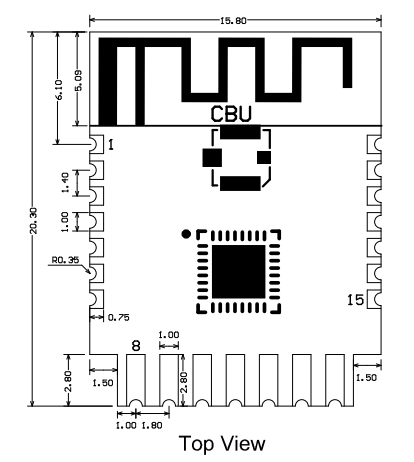
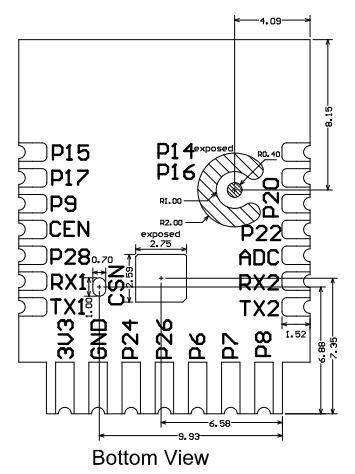
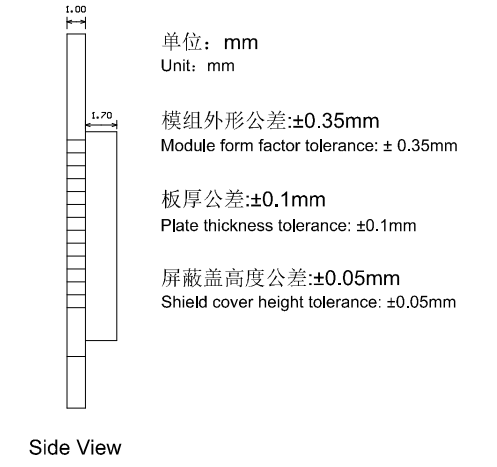
CBU推荐封装
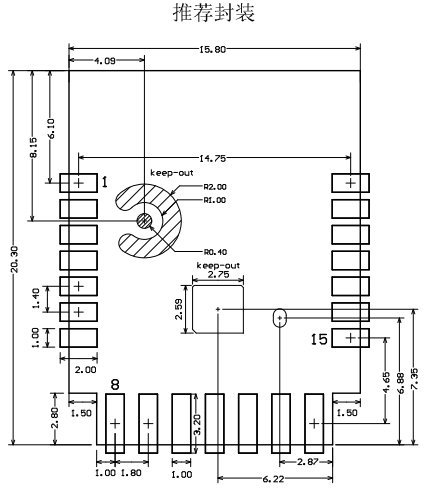
生产指南
- 涂鸦出厂的可贴可插封装模组根据客户底板设计方案选择组装方式,底板设计为贴片封装时使用SMT贴片制程进行生产,如果底板设计为插件封装时使用波峰焊制程进行生产。模组产品拆开包装后建议在24小时内完成焊接,否则需放置在湿度不超过10%RH的干燥柜内,或重新进行真空包装并记录暴露时间,总暴露时间不超过168小时。
- (SMT制程)SMT贴片所需仪器或设备:
- 贴片机
- SPI
- 回流焊
- 炉温测试仪
- AOI
- (波峰焊制程)波峰焊所需的仪器或设备:
- 波峰焊设备
- 波峰焊接治具
- 恒温烙铁
- 锡条、锡丝、助焊剂
- 炉温测试仪
- 烘烤所需仪器或设备:
- 柜式烘烤箱
- 防静电耐高温托盘
- 防静电耐高温手套
- (SMT制程)SMT贴片所需仪器或设备:
- 涂鸦出厂的模组存储条件如下:
-
防潮袋必须储存在温度<40℃、湿度<90%RH的环境中。
-
干燥包装的产品,保质期为从包装密封之日起12个月的时间。
-
密封包装内装有湿度指示卡:
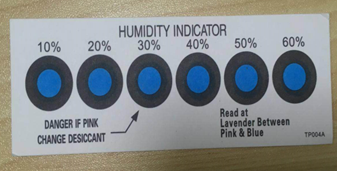
-
- 涂鸦出厂的模组当出现可能受潮的情况下需要进行烘烤:
- 拆封前发现真空包装袋破损
- 拆封后发现包装袋内没有湿度指示卡
- 拆封后如果湿度指示卡读取到10%及以上色环变为粉色
- 拆封后总暴露时间超过168小时
- 从首次密封包装之日起超过12个月
- 烘烤参数如下:
- 烘烤温度:卷盘包装60℃,湿度小于等于5%RH;托盘包装125℃,小于等于5%RH(耐高温托盘非吸塑盒拖盘)
- 烘烤时间:卷盘包装48小时;托盘包装12小时
- 报警温度设定:卷盘包装65℃;托盘包装135℃
- 自然条件下冷却到36℃以下后,即可进行生产
- 若烘烤后暴露时间大于168小时没有使用完,请再次进行烘烤
- 如果暴露时间超过168小时未经过烘烤,不建议使用回流焊或波峰焊接工艺焊接此批次模组,因模组为3级湿敏器件超过允许的暴露时间产品可能受潮,进行高温焊接时可能会导致器件失效或焊接不良
- 在整个生产过程中请对模组进行静电放电(ESD)保护。
- 为了确保产品合格率,建议使用SPI和AOI测试设备来监控锡膏印刷和贴装品质。
推荐炉温曲线
请根据制程选择相应的焊接方式,SMT参考回流焊接炉温曲线推荐,波峰焊制程参考波峰焊接炉温曲线推荐。设定炉温与实测炉温有一定差距,本文所示温度均为实测温度。
方式一:SMT制程(SMT回流焊接推荐炉温曲线)
请参考回流焊炉温曲线要求进行炉温设定,回流焊温度曲线如下图所示:
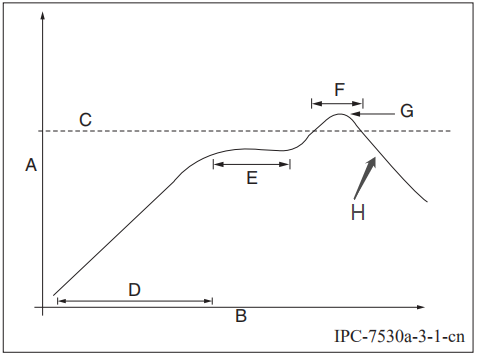
-
A:温度轴
-
B:时间轴
-
C:合金液相线温度区间为 217-220℃
-
D:升温斜率为 1-3℃/S
-
E:恒温时间为 60-120S;恒温温度区间为 150-200℃
-
F:液相线以上时间为 50-70S
-
G:峰值温度为 235-245℃
-
H:降温斜率为 1-4℃/S
注意:以上推荐曲线以SAC305合金焊膏为例;其他合金焊膏请按焊膏规格书推荐炉温曲线设置。
方式二:波峰焊制程(波峰焊接炉温曲线)
请参考波峰焊接炉温建议进行炉温设定,峰值温度260℃±5℃,波峰焊接温度曲线如下图所示:
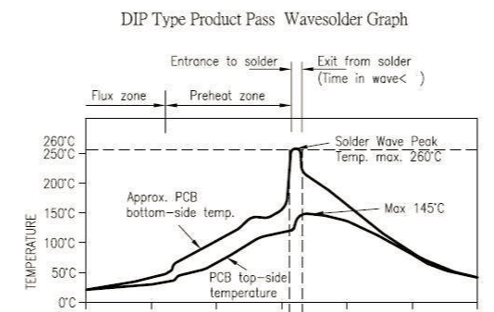
| 波峰焊接炉温曲线建议 | 手工补焊温度建议 | ||
|---|---|---|---|
| 预热温度 | 80-130℃ | 焊接温度 | 360℃±20℃ |
| 预热时间 | 75-100S | 焊接时间 | 小于3S/点 |
| 波峰接触时间 | 3-5S | NA | NA |
| 锡缸温度 | 260±5℃ | NA | NA |
| 升温斜率 | ≤2℃/S | NA | NA |
| 降温斜率 | ≤6℃/S | NA | NA |
储存条件
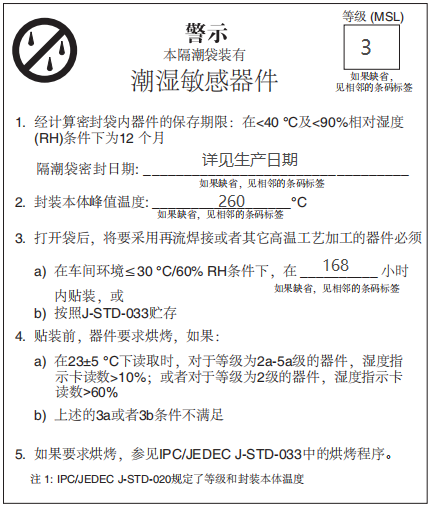
模组MOQ与包装信息
| 产品型号 | MOQ(pcs) | 出货包装方式 | 每个卷盘存放模组数(pcs) | 每箱包装卷盘数 |
|---|---|---|---|---|
| CBU | 4400 | 载带卷盘 | 1100 | 4 |
附录:声明
FCC Caution: Any changes or modifications not expressly approved by the party responsible for compliance could void the user’s authority to operate this device.
This device complies with Part 15 of the FCC Rules. Operation is subject to the following two conditions: (1) This device may not cause harmful interference, and (2) this device must accept any interference received, including interference that may cause undesired operation.
Note: This device has been tested and found to comply with the limits for a Class B digital device, according to part 15 of the FCC Rules. These limits are designed to provide reasonable protection against harmful interference in a residential installation. This device generates, uses, and can radiate radio frequency energy and, if not installed and used following the instructions, may cause harmful interference to radio communications. However, there is no guarantee that interference will not occur in a particular installation.
If this device does cause harmful interference to radio or television reception, which can be determined by turning the device off and on, the user is encouraged to try to correct the interference by one or more of the following measures:
- Reorient or relocate the receiving antenna.
- Increase the separation between the device and receiver.
- Connect the device into an outlet on a circuit different from that to which the receiver is connected.
- Consult the dealer or an experienced radio/TV technician for help.
Radiation Exposure Statement
This device complies with FCC radiation exposure limits set forth for an uncontrolled rolled environment. This device should be installed and operated with a minimum distance of 20cm between the radiator and your body.
Important Note
This radio module must not be installed to co-locate and operating simultaneously with other radios in the host system except following FCC multi-transmitter product procedures. Additional testing and device authorization may be required to operate simultaneously with other radios.
The availability of some specific channels and/or operational frequency bands are country dependent and are firmware programmed at the factory to match the intended destination. The firmware setting is not accessible by the end-user.
The host product manufacturer is responsible for compliance with any other FCC rules that apply to the host not covered by the modular transmitter grant of certification. The final host product still requires Part 15 Subpart B compliance testing with the modular transmitter installed.
The end-user manual shall include all required regulatory information/warnings as shown in this manual, including “This product must be installed and operated with a minimum distance of 20 cm between the radiator and user body”.
This device has got an FCC ID: 2ANDL-CBU. The end product must be labeled in a visible area with the following: “Contains Transmitter Module FCC ID: 2ANDL-CBU”.
This device is intended only for OEM integrators under the following conditions:
The antenna must be installed such that 20cm is maintained between the antenna and users, and the transmitter module may not be co-located with any other transmitter or antenna.
As long as the 2 conditions above are met, further transmitter tests will not be required. However, the OEM integrator is still responsible for testing their end-product for any additional compliance requirements required with this module installed.
Declaration of Conformity European Notice

Hereby, Hangzhou Tuya Information Technology Co., Ltd declares that this module product is in compliance with essential requirements and other relevant provisions of Directive 2014/53/EU,2011/65/EU. A copy of the Declaration of conformity can be found at https://www.tuya.com.
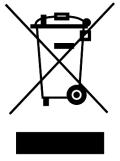
This product must not be disposed of as normal household waste, in accordance with the EU directive for waste electrical and electronic equipment (WEEE-2012/19/EU). Instead, it should be disposed of by returning it to the point of sale, or to a municipal recycling collection point.
The device could be used with a separation distance of 20cm to the human body.
该内容对您有帮助吗?
是意见反馈该内容对您有帮助吗?
是意见反馈